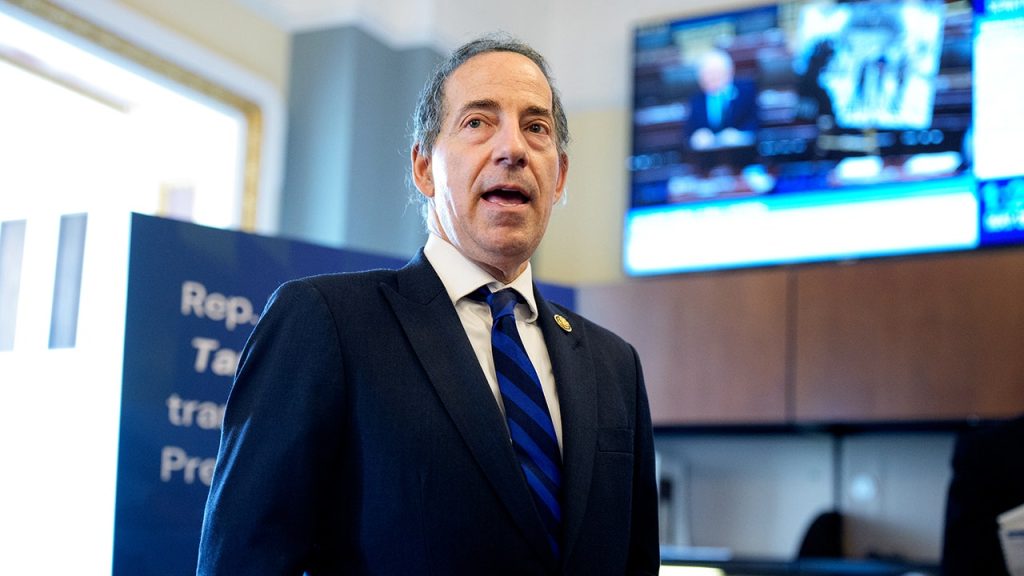Congressional Dispute: Plaskett’s Communications with Epstein Ignite House Controversy
In a heated exchange on the House floor, Representative Jamie Raskin (D-Md.) found himself at the center of criticism after defending Delegate Stacey Plaskett over her past communications with Jeffrey Epstein. The controversy erupted when Republicans, led by Rep. Ralph Norman (R-S.C.), introduced a resolution to censure Plaskett for what they described as “inappropriate coordination” with the convicted sex offender. The resolution came after the revelation that Plaskett had exchanged text messages with Epstein during a 2019 congressional hearing where Michael Cohen was testifying about his work with former President Trump. Raskin’s defense of Plaskett – suggesting she was merely “taking a phone call from her constituent” – prompted immediate backlash from both Republican colleagues and the White House Rapid Response team, who characterized his remarks as “dishonest” and “sick.”
The controversy highlights the complex relationship between Plaskett and Epstein, which appears to extend beyond mere constituent services. Independent journalist Lee Fang pointed out that court documents suggest a deeper connection, claiming that Plaskett had helped Epstein while serving in the Virgin Islands government by securing tax credits, later worked for Epstein’s associates, and received significant campaign support from Epstein and his aides. These allegations paint a more complicated picture than Raskin’s characterization of a simple phone call. Adding another layer to the story, some observers noted that Raskin had been Plaskett’s professor at American University’s law school, raising questions about potential bias in his passionate defense of his former student and current colleague.
Defending herself on the House floor, Plaskett acknowledged receiving texts from Epstein during the 2019 hearing but framed the communication differently than her critics. “I began to get innumerable texts from friends, from foes, from constituents about what was happening in that hearing. And I got a text from Jeffrey Epstein, who, at the time, was my constituent, who there was not public knowledge at that time that he was under federal investigation,” Plaskett explained. She forcefully rejected suggestions that she was taking advice from Epstein on how to question witnesses, asserting, “I don’t need to get advice on how to question anybody from any individual. I have been a lawyer for 30 years.” Her defense centered on portraying the exchange as routine constituent communication rather than improper coordination.
The debate over Plaskett’s actions reflects broader partisan tensions in Congress. Several Democratic colleagues joined Raskin in defending Plaskett, arguing that Republicans were attempting to “besmirch” their colleague unfairly. Raskin framed the censure attempt as an overreaction, questioning, “Are we saying just because they were on a phone call, they’re guilty of something? We should strip them of their committee assignments. We should censure them. Have we gotten to that point?” He appealed to principles of due process and constitutional protections, suggesting the Republican-led effort was primarily motivated by partisan interests rather than genuine ethical concerns. This defense strategy positioned the censure attempt as part of a pattern of politically motivated attacks rather than legitimate oversight.
Conservative critics were quick to respond to Raskin’s defense with skepticism and mockery. The White House Rapid Response team described Raskin as “one of the worst to ever disgrace the halls of Congress” and characterized Democrats defending Plaskett as “SICK!” Conservative commentators and journalists similarly rejected Raskin’s framing, with Red State writer Bonchie sarcastically noting, “Let the person that hasn’t colluded with a convicted sex offender to rig the questions in a hearing cast the first stone.” Other commentators questioned whether Raskin’s passionate defense might be motivated by concerns about what else might be revealed about Democratic connections to Epstein, highlighting the politically charged nature of the controversy.
Despite the intense debate and serious allegations, the resolution to censure Plaskett and remove her from committee assignments ultimately failed in a House vote Tuesday night. The failed censure attempt represents just one chapter in the ongoing political fallout from Epstein’s crimes and connections. The controversy underscores how figures associated with Epstein continue to face scrutiny across the political spectrum, with partisan interpretations shaping how these connections are understood and addressed. For Plaskett, while she avoided formal censure, questions about her relationship with Epstein will likely persist, reflecting the broader challenge of addressing accountability for those who had professional or political relationships with the disgraced financier before his crimes became widely known.


